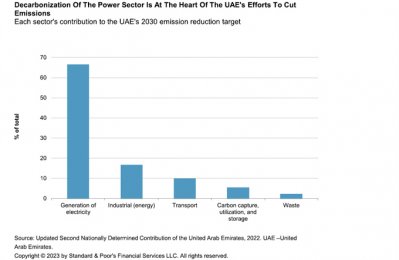[ad_1]
Gulf states are likely to make significant investments in renewable energy over the current decade as they implement plans to decarbonize their power sectors, according to a new report from S&P Global Ratings.
Despite their reliance on the oil and gas industry, the Gulf states have all announced new targets or reaffirmed their commitment to the Paris Agreement in the past two years, the report noted.
As one of the largest sources of emissions, the power sector features heavily in most national decarbonization plans.
Solar PV is particularly well suited to the region, but installed capacity remains low relative to many other regions. The UAE and Saudi Arabia will have 3 gigawatts (GW) of installed capacity in 2021; just 165 megawatts (MW) in 2016.
Saudi Arabia and the UAE
The region’s two largest economies – the United Arab Emirates (UAE) and Saudi Arabia – continue to lead climate-related work in the Gulf Cooperation Council (GCC). Around 90% of the region’s built renewable energy capacity by the end of 2021 will come from these countries, with the UAE alone accounting for 77%. They also pledged to update the target as part of a new effort to achieve net-zero emissions, the report highlighted.
The governments of Saudi Arabia and the UAE have announced their intention to continue investing in renewable energy, and the report argues that plans to build a renewable energy sector could help them work towards climate goals.
A government-related entity leads the procurement, inviting bids from local and international developers. Most developers then finance the assets on a non-recourse basis, which means using large amounts of commercial bank debt. However, both the UAE and Saudi Arabia have established public-private partnership frameworks, making project financing an obvious option for capital deployment.
“As the region’s energy transition progresses, we expect to see more renewable energy projects using capital markets for financing, including an increasing number of solar PV projects,” the report said.
“Across our global portfolio of solar PV projects, key credit qualities include maintenance timing and budget, availability and good management of solar panel degradation.”
Renewable energy is part of the climate roadmap
The Paris Agreement requires all signatories to set and maintain targets, known as Nationally Determined Contributions (NDCs). While circumstances vary, all governments in the region have publicly announced their net-zero emissions targets and are looking to deploy renewable energy to meet climate commitments in their Nationally Determined Contributions.
The power sector is a major source of emissions. The United Arab Emirates and Saudi Arabia – producing the most greenhouse gas (GHG) emissions in the GCC in absolute terms – have made the largest investments in renewable energy.Their
The government is one of many countries around the world to publicly announce its net-zero emissions target and roadmap to get there.
business as usual scenario
Many countries, including GCC countries, refer to a Business as Usual (BAU) scenario to set their NDCs. This is a counterfactual baseline scenario based on the emissions that would have been expected to have occurred had no climate change mitigation measures been taken since the base year, combined with the impact of economic growth on emissions.
This means that in the short run, emissions in some countries may continue to increase in absolute terms, but decrease compared to what would have been the case without policy intervention.
In 2022, the UAE raised its GHG emissions target to 31% of 2030 levels (relative to its BAU scenario) in its second NDC. Its earlier commitment was a 23.5% reduction relative to BAU levels. Under the new NDC, the UAE will limit emissions to 208 million metric tons of carbon dioxide equivalent (CO2e) in 2030, compared to the 301.2 million metric tons of CO2e projected under its BAU scenario.
The UAE’s 2050 Renewable Energy Strategy states that decarbonization of the power sector is a key priority. Renewable energy datasets from organizations such as the International Renewable Energy Agency (IRENA) do not include nuclear power; in contrast, the UAE includes both nuclear and renewables in its definition of “clean energy”. The UAE aims to make clean energy 30% of its energy mix by 2030 and 50% by 2050.
In 2021, Saudi Arabia announced the renewal of its NDC. By 2030, it now intends to reduce, avoid and eliminate emissions of 278 million tonnes of carbon dioxide equivalent per year. NDC uses 2019 as the base year. To achieve this, it aims to generate around 50% of its electricity from renewable sources by 2030. Saudi Arabia has also set a net-zero target for 2060, the report noted. -TradeArabia News Service
[ad_2]
Source link



